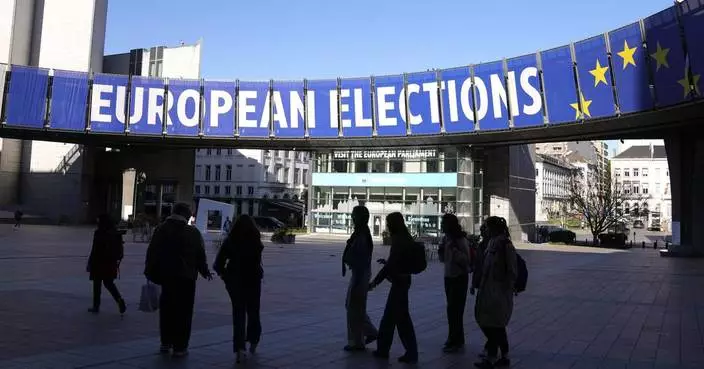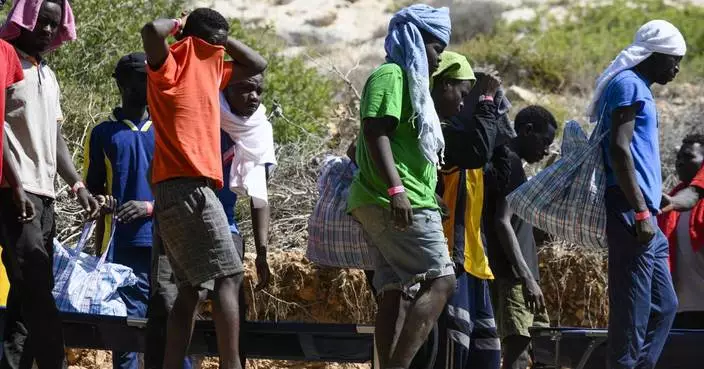In March 2016, European governments breathed a sigh of relief as the European Union reached a deal with Turkey designed to stop hundreds of thousands of refugees and migrants heading into the heart of Europe. For many of those who had fled war, hunger and poverty hoping for a bright future on the continent, the deal shattered their dreams.
Three years on, here is a look back at the agreement and the effect it's had on migration.
Click to Gallery
In March 2016, European governments breathed a sigh of relief as the European Union reached a deal with Turkey designed to stop hundreds of thousands of refugees and migrants heading into the heart of Europe. For many of those who had fled war, hunger and poverty hoping for a bright future on the continent, the deal shattered their dreams.
One of the main provisions of the deal, which came into effect on March 20, 2016, was that all those arriving on Greek islands from the nearby Turkish coast — the preferred route at the time — would be detained and returned to Turkey unless they successfully applied for asylum in Greece. They wouldn't be able to move on to the Greek mainland, from where hundreds of thousands before them had made their way through the Balkans and on to central and northern Europe.
On a very basic level of reducing the number of asylum-seekers heading to other European countries, the deal was very effective.
Aid groups have repeatedly slammed the deal as inhumane, noting it has left thousands stranded in miserable conditions. On the eve of its third anniversary, 25 human rights, medical aid and volunteer groups signed an open letter calling on European leaders "to take immediate and sustained action to end the unfair and unnecessary containment policy."
The stipulation of new arrivals being held on the islands has left thousands languishing in crammed camps. Samos island has seen the worst overcrowding, with around 4,000 people vying for space in a camp with a capacity of 648. The largest camp in the eastern Aegean, Moria on the island of Lesbos which holds more than 4,800 people in facilities designed for 3,100, has come under the severest criticism from rights groups and even local officials over poor living and security conditions.
"Greece has become a dumping ground for the men, women and children that the European Union has failed to protect," Emmanuel Goue of the Doctors Without Borders medical aid group said in a statement on the third anniversary of the EU-Turkey deal.
The increased difficulty heading into Europe from the Greek islands meant migrants and refugees soon sought out alternative routes to get into the EU. With more than 57,000 unauthorized arrivals by sea in 2018, Spain became the No. 1 route to the EU by sea. The figure was more than double the number of arrivals in 2017 at 21,000. NGOs and the Spanish government itself blamed the increase on the EU-Turkey deal and on later agreements with Libya which essentially shut down the central Mediterranean route which had seen boats head from Libya to Italy.
WHAT DID THE EU-TURKEY DEAL SAY?
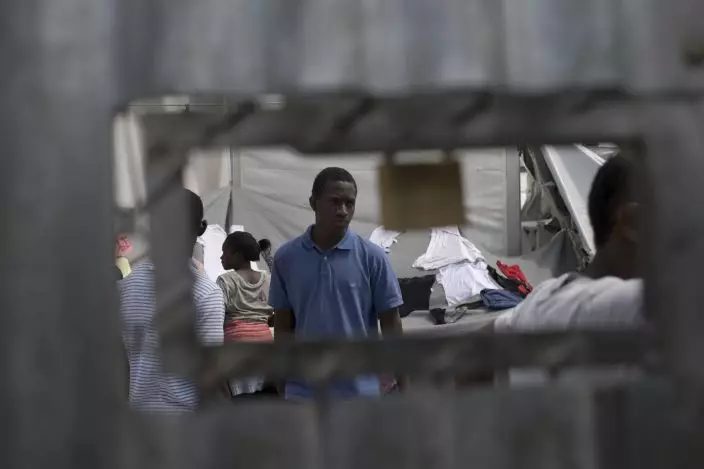
FILE - In this Friday, May 4, 2018 file photo, newly arrived migrants and refugees wait to be registered by authorities in Moria Camp, on Lesbos, Greece. European governments breathed a sigh of relief as the European Union reached a deal with Turkey designed to stop hundreds of thousands of refugees and migrants heading into the heart of Europe. For many of those who had fled war, hunger and poverty hoping for a bright future on the continent, the deal shattered their dreams. (AP PhotoPetros Giannakouris, File)
One of the main provisions of the deal, which came into effect on March 20, 2016, was that all those arriving on Greek islands from the nearby Turkish coast — the preferred route at the time — would be detained and returned to Turkey unless they successfully applied for asylum in Greece. They wouldn't be able to move on to the Greek mainland, from where hundreds of thousands before them had made their way through the Balkans and on to central and northern Europe.
However, the deportations didn't go as planned. Instead of waiting to apply for asylum in their preferred European country, new arrivals applied as soon as they arrived on the islands, which delayed deportations and created a massive backlog in Greece's asylum system. In practice, actual deportations have been very few and far between.
DID THE AGREEMENT WORK?
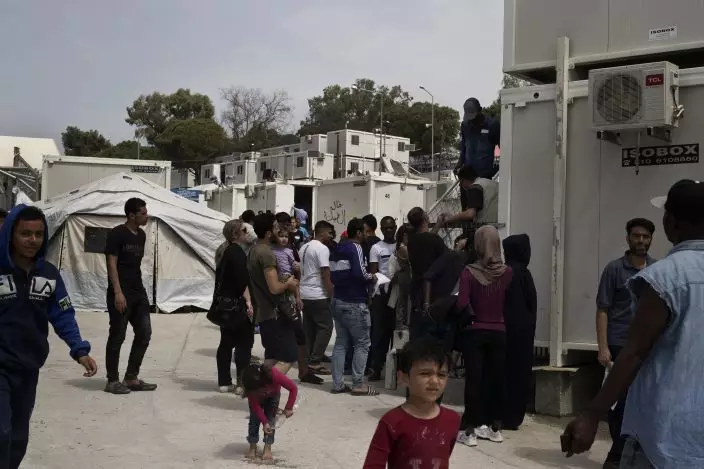
FILE - In this Friday, May 4, 2018 file photo, migrants and refugees wait outside the UNHCR offices for their papers, inside the camp of Moria, Lesbos island, Greece. European governments breathed a sigh of relief as the European Union reached a deal with Turkey designed to stop hundreds of thousands of refugees and migrants heading into the heart of Europe. For many of those who had fled war, hunger and poverty hoping for a bright future on the continent, the deal shattered their dreams. (AP PhotoPetros Giannakouris, File)
On a very basic level of reducing the number of asylum-seekers heading to other European countries, the deal was very effective.
More than 1.2 million people registered for asylum in EU member states in 2015 and again in 2016, at the height of the crisis. That number fell by half the following year, with just over 654,000 new asylum applications in 2017 and even fewer — just over 580,000 — in 2018, according to the EU's statistics office Eurostat. Germany continues to be the most popular country for those seeking refugee status, followed by France and Greece. The main countries of origin of the applicants are Syria, Afghanistan and Iraq.
But the reduction in numbers has come at a cost.
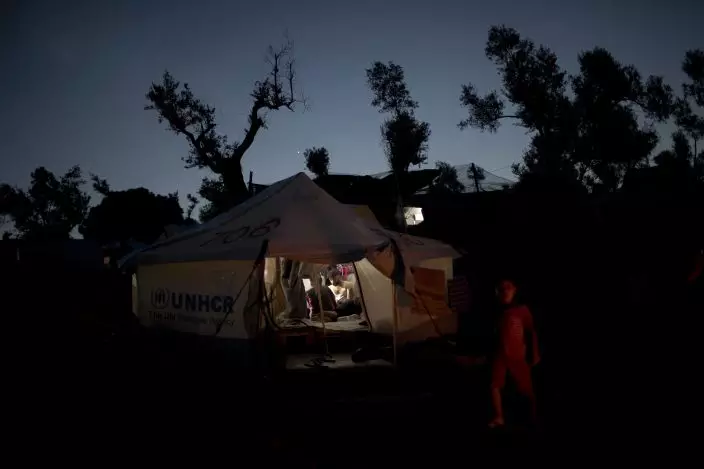
FILE - In this Tuesday, May 2, 2018 file photo, a Syrian family sit inside a tent at a makeshift camp outside Moria on the northeastern Aegean island of Lesbos, Greece. European governments breathed a sigh of relief as the European Union reached a deal with Turkey designed to stop hundreds of thousands of refugees and migrants heading into the heart of Europe. For many of those who had fled war, hunger and poverty hoping for a bright future on the continent, the deal shattered their dreams. (AP PhotoPetros Giannakouris, File)
Aid groups have repeatedly slammed the deal as inhumane, noting it has left thousands stranded in miserable conditions. On the eve of its third anniversary, 25 human rights, medical aid and volunteer groups signed an open letter calling on European leaders "to take immediate and sustained action to end the unfair and unnecessary containment policy."
It has also not completely stopped arrivals on Greek islands, although the numbers are far lower than the thousands per day in 2015 and early 2016.
WHAT IS THE SITUATION ON THE ISLANDS?

FILE - In this Friday, May 4, 2018 file photo, a woman walks with her baby as migrants and refugees wait outside the UNHCR offices for their papers inside the camp of Moria, Lesbos island, Greece. European governments breathed a sigh of relief as the European Union reached a deal with Turkey designed to stop hundreds of thousands of refugees and migrants heading into the heart of Europe. For many of those who had fled war, hunger and poverty hoping for a bright future on the continent, the deal shattered their dreams. (AP PhotoPetros Giannakouris, File)
The stipulation of new arrivals being held on the islands has left thousands languishing in crammed camps. Samos island has seen the worst overcrowding, with around 4,000 people vying for space in a camp with a capacity of 648. The largest camp in the eastern Aegean, Moria on the island of Lesbos which holds more than 4,800 people in facilities designed for 3,100, has come under the severest criticism from rights groups and even local officials over poor living and security conditions.
Greek authorities note that the terms of the EU-Turkey agreement prevent them from moving people off the islands en masse. Instead, they have tried to ease overcrowding by sending to the mainland those designated as vulnerable — such as the sick or very elderly, families with young children or single parent families.
But with dozens, sometimes hundreds, arriving each week, that hasn't been enough to definitively deal with the problem. As of Monday night, a total of 14,742 people were being held on the islands, most of them on Lesbos, Samos, Chios, Leros and Kos.

FILE - In this Friday, May 4, 2018 file photo, migrants and refugees wait outside the European Asylum Support Service offices inside the camp of Moria on the northeastern Aegean island of Lesbos, Greece. European governments breathed a sigh of relief as the European Union reached a deal with Turkey designed to stop hundreds of thousands of refugees and migrants heading into the heart of Europe. For many of those who had fled war, hunger and poverty hoping for a bright future on the continent, the deal shattered their dreams. (AP PhotoPetros Giannakouris, File)
"Greece has become a dumping ground for the men, women and children that the European Union has failed to protect," Emmanuel Goue of the Doctors Without Borders medical aid group said in a statement on the third anniversary of the EU-Turkey deal.
"What was once touted as a 'refugee emergency' has given way to inexcusable levels of human suffering across the Greek islands and on mainland Greece," Goue said. "The EU and Greek authorities continue to rob vulnerable people of their dignity and health, seemingly in an effort to deter others from coming. This policy is cruel, inhumane and cynical, and it needs to end."
WHAT ABOUT THE REST OF EUROPE?
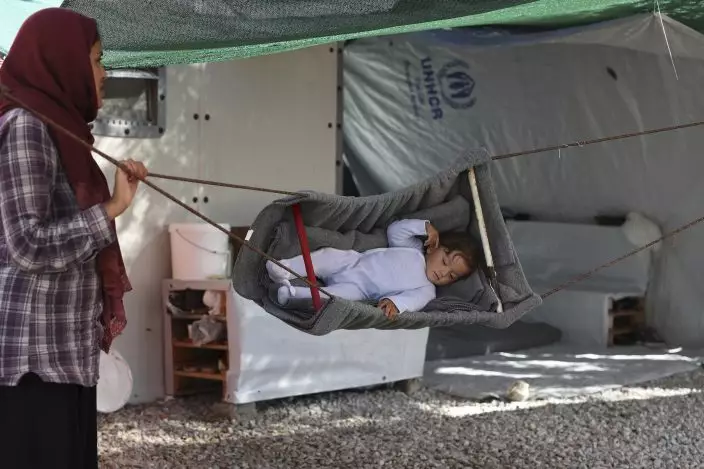
FILE - In this Thursday, Oct. 6, 2016 file photo, a woman uses a makeshift swing for a small child at the Kara Tepe camp for refugees and other migrants on Lesbos island, Greece. European governments breathed a sigh of relief as the European Union reached a deal with Turkey designed to stop hundreds of thousands of refugees and migrants heading into the heart of Europe. For many of those who had fled war, hunger and poverty hoping for a bright future on the continent, the deal shattered their dreams. (AP PhotoPetros Giannakouris, File)
The increased difficulty heading into Europe from the Greek islands meant migrants and refugees soon sought out alternative routes to get into the EU. With more than 57,000 unauthorized arrivals by sea in 2018, Spain became the No. 1 route to the EU by sea. The figure was more than double the number of arrivals in 2017 at 21,000. NGOs and the Spanish government itself blamed the increase on the EU-Turkey deal and on later agreements with Libya which essentially shut down the central Mediterranean route which had seen boats head from Libya to Italy.
There has, however, been a sharp decrease in the number of arrivals by sea in Spain in late 2018 and the first three months of this year.
More people are also dying. According to the International Organization for Migration, around 2,300 people died crossing the Mediterranean Sea last year, almost double the year before. Nearly one third of them perished in the so-called Western Mediterranean, which links the northwestern African coast with European coasts in Spain.
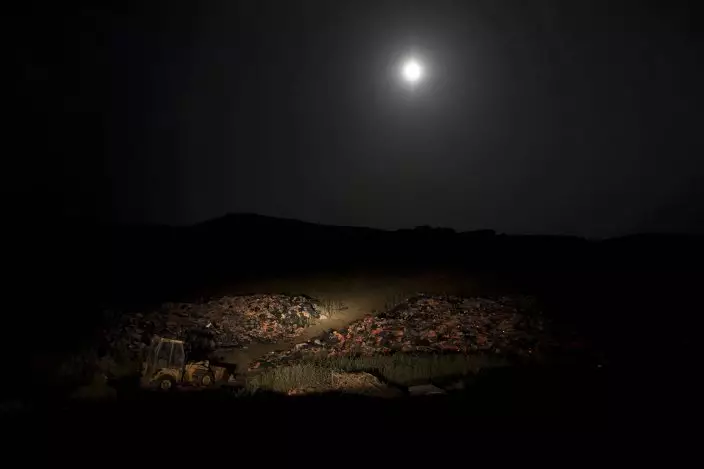
FILE - In this early Saturday May 5, 2018 file photo, the moon rises above piles of discarded life vests and dinghies used by migrants and refugees crossing from the nearby Turkish coast, at a dump on the Greek island of Lesbos. European governments breathed a sigh of relief as the European Union reached a deal with Turkey designed to stop hundreds of thousands of refugees and migrants heading into the heart of Europe. For many of those who had fled war, hunger and poverty hoping for a bright future on the continent, the deal shattered their dreams. (AP PhotoPetros Giannakouris, File)
Aritz Parra in Madrid, and Derek Gatopoulos in Athens, contributed to this report.
BRUSSELS (AP) — European Union nations endorsed sweeping reforms to the bloc’s failed asylum system on Tuesday as campaigning for Europe-wide elections next month gathers pace, with migration expected to be an important issue.
EU government ministers approved 10 legislative parts of The New Pact on Migration and Asylum. It lays out rules for the 27 member countries to handle people trying to enter without authorization, from how to screen them to establish whether they qualify for protection to deporting them if they’re not allowed to stay.
Hungary and Poland, which have long opposed any obligation for countries to host migrants or pay for their upkeep, voted against the package but were unable to block it.
Mainstream political parties believe the pact resolves the issues that have divided member nations since well over 1 million migrants swept into Europe in 2015, most fleeing war in Syria and Iraq. They hope the system will starve the far right of vote-winning oxygen in the June 6-9 elections.
However, the vast reform package will only enter force in 2026, bringing no immediate fix to an issue that has fueled one of the EU’s biggest political crises, dividing nations over who should take responsibility for migrants when they arrive and whether other countries should be obligated to help.
Critics say the pact will let nations detain migrants at borders and fingerprint children. They say it’s aimed at keeping people out and infringes on their right to claim asylum. Many fear it will result in more unscrupulous deals with poorer countries that people leave or cross to get to Europe.
Europe’s asylum laws have not been updated for about two decades. The system frayed and then fell apart in 2015. It was based on the premise that migrants should be processed, given asylum or deported in the country they first enter. Greece, Italy and Malta were left to shoulder most of the financial burden and deal with public discontent. Since then, the ID-check-free zone known as the Schengen Area has expanded to 27 countries, 23 of them EU members. It means that more than 400 million Europeans and visitors, including refugees, are able to move without showing travel documents.
Some 3.5 million migrants arrived legally in Europe in 2023. Around 1 million others were on EU territory without permission. Of the latter, most were people who entered normally via airports and ports with visas but didn’t go home when they expired. The pact applies to the remaining minority, estimated at around 300,000 migrants last year. They are people caught crossing an external EU border without permission, such as those reaching the shores of Greece, Italy or Spain via the Mediterranean Sea or Atlantic Ocean on boats provided by smugglers.
The country on whose territory people land will screen them at or near the border. This involves identity and other checks -– including on children as young as 6. The information will be stored on a massive new database, Eurodac. This screening should determine whether a person might pose a health or security risk and their chances of being permitted to stay. Generally, people fleeing conflict, persecution or violence qualify for asylum. Those looking for jobs are likely to be refused entry. Screening is mandatory and should take no longer than seven days. It should lead to one of two things: an application for international protection, like asylum, or deportation to their home country.
People seeking asylum must apply in the EU nation they first enter and stay until the authorities there work out what country should handle their application. It could be that they have family, cultural or other links somewhere else, making it more logical for them to be moved. The border procedure should be done in 12 weeks, including time for one legal appeal if their application is rejected. It could be extended by eight weeks in times of mass movements of people. Procedures could be faster for applicants from countries whose citizens are not often granted asylum. Critics say this undermines asylum law because applicants should be assessed individually, not based on nationality. People would stay in “reception centers” while it happens, with access to health care and education. Those rejected would receive a deportation order.
To speed things up, a deportation order is supposed to be issued automatically when an asylum request is refused. A new 12-week period is foreseen to complete this process. The authorities may detain people throughout. The EU’s border and coast guard agency would help organize joint deportation flights. Currently, less than one in three people issued with an order to leave are deported. This is often due to a lack of cooperation from the countries these people come from.
The new rules oblige countries to help an EU partner under migratory pressure. Support is mandatory, but flexible. Nations can relocate asylum applicants to their territory or choose some other form of assistance. This could be financial -– a relocation is evaluated at 20,000 euros ($21,462) per person -– technical or logistical. Members can also assume responsibility for deporting people from the partner country in trouble.
Two issues stand out: Will member countries ever fully enact the plan, and will the EU’s executive branch, the European Commission, enforce the new rules when it has chosen not to apply the ones already in place? The commission is due to present a Common Implementation Plan by June. It charts a path and timeline to get the pact working over the next two years, with targets that the EU and member countries should reach. Things could get off to a rocky start. Hungary, which has vehemently opposed the reforms, takes over the EU’s agenda-setting presidency for six months on July 1.
Associated Press journalists Renata Brito in Barcelona, Spain, contributed to this report.

Migrants sit on the deck of the Sea Watch-3 rescue ship in the Maltese search and rescue zone of the Mediterranean Sea on Oct. 19, 2021. IEuropean Union nations will discuss on Tuesday, May 14, 2024, sweeping new reforms to the bloc's failed asylum system as campaigning for Europe-wide elections next month gathers pace, with migration expected to be an important issue. (AP Photo/Valeria Mongelli, File)

FILE - Migrants disembark from a Greek coast vessel after a rescue operation, at the port of Mytilene, on the northeastern Aegean Sea island of Lesbos, Greece, Monday, Aug. 28, 2023. European Union nations will discuss on Tuesday, May 14, 2024, sweeping new reforms to the bloc's failed asylum system as campaigning for Europe-wide elections next month gathers pace, with migration expected to be an important issue. (AP Photo/Panagiotis Balaskas, File)

FILE - Two men share a meal in a makeshift tent camp outside the Petit Chateau reception center in Brussels, Tuesday, Jan. 17, 2023. European Union nations will discuss on Tuesday, May 14, 2024, sweeping new reforms to the bloc's failed asylum system as campaigning for Europe-wide elections next month gathers pace, with migration expected to be an important issue. (AP Photo/Olivier Matthys, File)

FILE -Migrants rest on the deck of Sea Watch-3 rescue ship in Maltese SAR zone, Tuesday, Oct. 19, 2021. European Union nations will discuss on Tuesday, May 14, 2024, sweeping new reforms to the bloc's failed asylum system as campaigning for Europe-wide elections next month gathers pace, with migration expected to be an important issue. (AP Photo/Valeria Mongelli, File)

FILE - A cemetery, filled with graves mostly from migrants trying to reach the Greek island of Lesbos, is seen from above at Kato Tritos village on the northeastern Aegean Sea island of Lesbos, Greece, on Wednesday, April 17, 2024. European Union nations will discuss on Tuesday, May 14, 2024, sweeping new reforms to the bloc's failed asylum system as campaigning for Europe-wide elections next month gathers pace, with migration expected to be an important issue. (AP Photo/Panagiotis Balaskas, File)

FILE - Opponents of France's immigration law protest with banners that read, "Freedom, equality, fraternity" and "no to the immigration law" at Trocadero Plaza near Eiffel Tower in Paris, Sunday, Jan. 21, 2024. European Union nations will discuss on Tuesday, May 14, 2024, sweeping new reforms to the bloc's failed asylum system as campaigning for Europe-wide elections next month gathers pace, with migration expected to be an important issue. (AP Photo/Thomas Padilla, File)

FILE - Refugees wait in line at the Office of Migration in Brussels on Thursday, Oct. 1, 2015. European Union nations will discuss on Tuesday, May 14, 2024, sweeping new reforms to the bloc's failed asylum system as campaigning for Europe-wide elections next month gathers pace, with migration expected to be an important issue. (AP Photo/Geert Vanden Wijngaert, File)

FILE - Migrants aboard a rubber boat end up in the water while others cling on to a centifloat before being rescued by a team of the Sea Watch-3, around 35 miles away from Libya, Monday, Oct. 18, 2021. European Union nations will discuss on Tuesday, May 14, 2024, sweeping new reforms to the bloc's failed asylum system as campaigning for Europe-wide elections next month gathers pace, with migration expected to be an important issue. (AP Photo/Valeria Mongelli, File)




















